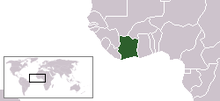LGBT rights in the Ivory Coast
 | |
| Status | Legal[1] |
| Gender identity | – |
| Military | Unknown |
| Discrimination protections | No |
| Family rights | |
| Recognition of relationships | No |
| Adoption | – |
Lesbian, gay, bisexual, and transgender (LGBT) persons in Côte d'Ivoire may face legal challenges not experienced by non-LGBT residents. Both male and female same-sex sexual activity is legal in Côte d'Ivoire, but same-sex couples and households headed by same-sex couples are not eligible for the same legal protections available to opposite-sex couples.
Laws regarding same-sex sexual activity
Same-sex sexual acts are legal and have never been criminalized within the country.[1] Paul Canning, writing for Care2, stated that this is likely because the Ivory Coast is a "former French colony", leading it to never develop any laws against sodomy, unlike some former British colonies in the area.[2]
There is one law that restricts homosexuality, Article 360 of the Penal Code, which states that homosexual sexual acts are a "indecent behavior", though only when enacted in public.[3]
Recognition of same-sex relationships
The government of Côte d'Ivoire does not recognize same-sex marriages.
Discrimination protections
There is no legal protection against discrimination based on sexual orientation.
However, in March of 2010, while attending the United Nations Human Right Council Universal Periodic Review, the Ivory Coast representative stated that they would begin, "to take measures to ensure non-discrimination on grounds of sexual orientation and gender identity", but that they would not start "awareness-raising programs" because it was not a "current priority".[2]
Living conditions
The U.S. Department of State's 2010 Human Rights Report found that "societal stigmatization of the lesbian, gay, bisexual, and transgender (LGBT) community was widespread, and the government did not act to counter it during the year. There were few LGBT organizations in the country. Arc en Ciel, the primary NGO representing the LGBT community, operated freely; however, the government required the organization to amend its by-laws to include non-LGBT members before the organization's status was officially approved." The report also found that "there was no official discrimination based on sexual orientation in employment, housing, statelessness, or access to education or health care. However, gay men were subjected to beatings, imprisonment, verbal abuse, humiliation, and extortion by police, gendarmes, and members of the armed forces."[4]
Paul Canning interviewed the President of a LGBT group, Alternative Côte d’Ivoire, where it was explained that an incident prior had had a doctor refuse service to a patient due to the patient's sexual orientation. This led the group to protest outside the healthcare center where the doctor worked, eventually ending with the patient receiving care. The President, Touré Claver, stated that overall, "There is still discrimination against gay people, but generally we are moving toward relative tolerance."[2][3]
See also
References
- ^ a b "State-sponsored Homophobia: A world survey of laws prohibiting same sex activity between consenting adults" (PDF).
- ^ a b c Paul Canning (11 October 2011). "Is Ivory Coast Truly an Oasis for LGBT People?". Care2. Retrieved 31 January 2012.
- ^ a b Selay Marius Kouassi (20 September 2011). "Ivory Coast: Abidjan is becoming a gay Eldorado". Radio Netherlands Worldwide. Retrieved 31 January 2012.
- ^ http://www.state.gov/documents/organization/160454.pdf
